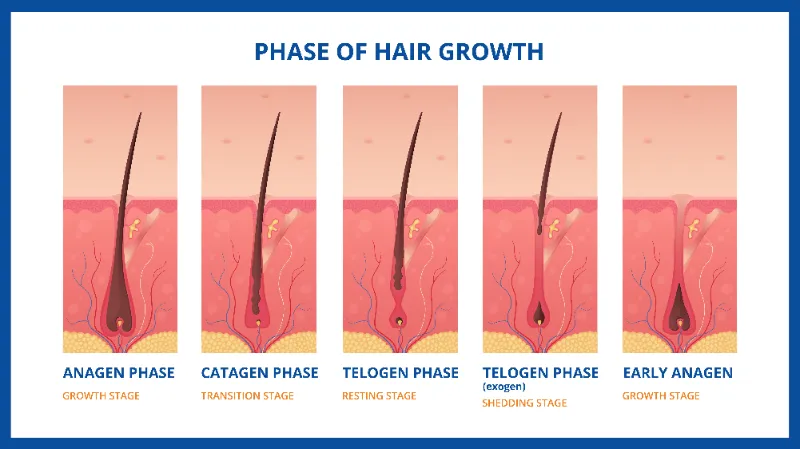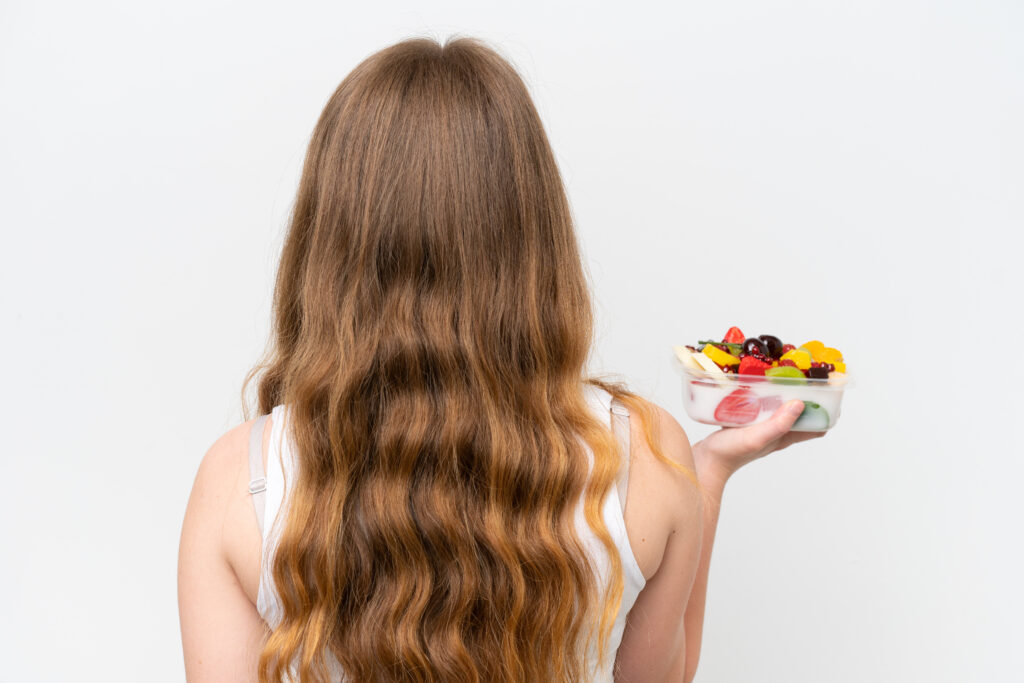Nutrition and Hair Health

Are you ready to unlock the secrets of luscious locks with the help of a deep conditioner? Look no further! Hair health is not just about beauty—it’s a reflection of our overall well-being. The food we consume plays a crucial role in nurturing our bodies, including maintaining healthy hair. But what exactly does nutrition have to do with shampooing and using coconut oil?
From hair growth to preventing hair loss, proper nutrition, including the use of shampooing and conditioner, and incorporating coconut oil, can work wonders for your mane. We’ll explore how different nutrients, such as coconut oil, impact hair health, uncover tips for scalp care, and even discuss common hair-related concerns like acne. We’ll address the effects of heat styling tools and hair dye on your tresses. So grab a seat and get ready to dive deep into the world of hair care!
In the next section, we’ll kick things off by examining how nutrition affects not only our skin but also our scalp health—a vital component of vibrant and resilient hair. We’ll explore the impact of deep conditioner and shampoo on scalp health, as well as the connection between acne and scalp health, as noted by dermatologists.
Stay tuned for an enlightening journey through the realm of hair health, including the importance of using the right shampoo, brush, and conditioner, and taking care of your skin.
II. Understanding Hair Health
The condition of our hair, including its health and vibrancy, is influenced by various factors such as the hair growth cycle, shampoo, conditioner, skin, and brush. Let’s delve into these aspects to gain a better understanding of how to maintain vibrant and lustrous strands.

The Hair Growth Cycle
Hair goes through a natural growth cycle, consisting of three phases: anagen, catagen, and telogen. During the anagen phase, hair follicles produce new cells that form the basis for hair growth. This phase can last for several years, resulting in longer strands. Using the right shampoo and conditioner is essential for maintaining healthy hair and skin health. Next comes the catagen phase, a transitional period where hair stops growing and detaches from the blood supply. Finally, during the telogen phase, old hairs are shed to make room for new ones. It’s important to note that images can be helpful in understanding these hair growth phases.
Factors Affecting Hair Health
Several factors, including shampoo and conditioner, play a role in determining the overall health of our hair and skin. These entities are crucial for maintaining healthy hair.
- Genetics: Genetics plays a crucial role in determining the color and texture of our hair, as well as our overall skin health. Our genetic makeup influences these aspects of our hair.
- Age: As we grow older, certain changes occur within our bodies that affect hair and skin health. The rate of cell regeneration slows down over time, leading to thinner and weaker strands and loss of skin elasticity. These changes can be visualized through images and are caused by natural processes within our entities.
- Hormonal Imbalances and Skin Health: Hormones can significantly impact the condition of our hair, as well as our skin health. Fluctuations in hormone levels may cause issues like excessive shedding or changes in texture, which can affect the overall health of our skin.
To maintain optimal hair and skin health, it is important to provide your strands and entities with essential nutrients such as zinc—a vital source for strong and healthy locks and loss. Additionally, ensuring that your text content includes these nutrients can greatly benefit the overall health of your skin and hair.
Understanding these factors can help us identify potential causes for any changes or concerns regarding our hair’s appearance, condition, and skin health. By nourishing our strands with proper care, nutrition, and entities, we can ensure they remain vibrant and resilient throughout each stage of their growth cycle. Additionally, incorporating relevant images and citing credible sources can further enhance our understanding of hair and skin health.
Remember—healthy habits lead to healthy locks!
III. Nutrients Essential for Healthy Hair
Proper nutrition plays a crucial role in maintaining hair, skin, and overall health. Here are some essential nutrients that can help promote healthy hair and skin. In addition to nourishing your body, it’s also important to pay attention to the advertisement, images, and text content you consume.

- Protein: Adequate protein intake is necessary for strong and healthy hair growth. Protein-rich foods like lean meats, eggs, and legumes provide the building blocks needed to support hair follicles.
- Omega-3 Fatty Acids: These healthy fats contribute to scalp health and prevent dryness, which can lead to brittle hair. Including sources of omega-3 fatty acids such as fish, flaxseeds, and walnuts in your diet can help nourish your hair.
- Vitamins: Various vitamins play a vital role in maintaining the overall health of your hair.
- Vitamin A: This soluble vitamin helps produce sebum, an oily substance that moisturizes the scalp. Carrots, sweet potatoes, and spinach are excellent sources of vitamin A.
- Vitamin C: Known for its antioxidant properties, vitamin C aids in collagen production, which strengthens hair strands. Citrus fruits, strawberries, and bell peppers are rich in this essential vitamin.
- Vitamin E: Vitamin E promotes blood circulation to the scalp and protects against oxidative stress. Almonds, sunflower seeds, and spinach are good sources of vitamin E.
- B-Vitamins: B vitamins like biotin (B7) and niacin (B3) are crucial for healthy hair growth. They assist in carrying oxygen and nutrients to the scalp. Whole grains, eggs, and nuts contain these important vitamins.
- Minerals: Certain minerals are essential for maintaining strong and lustrous hair.
- Iron: Iron deficiency can lead to hair loss or thinning. Incorporate iron-rich foods like red meat, spinach, and lentils into your diet to support healthy hair growth.
- Zinc: Zinc helps regulate oil production in the scalp and aids in hair tissue repair. Oysters, pumpkin seeds, and beef are good sources of zinc.
- Selenium: This mineral plays a role in the synthesis of proteins necessary for hair growth. Including selenium-rich foods such as Brazil nuts, seafood, and whole grains can contribute to optimal hair health.
By ensuring you consume a balanced diet with these essential nutrients, you can support the health of your hair from within. Remember to consult with a healthcare professional or registered dietitian for personalized advice regarding your specific nutritional needs.
IV. Foods for Strong and Shiny Hair
Protein-rich Foods
- Lean meats
- Fish and seafood
- Eggs
- Legumes and beans

Omega-3 Fatty Acid Sources
- Fatty fish
- Flaxseeds and chia seeds
- Walnuts
Vitamin-Rich Foods
- Sweet potatoes
- Citrus fruits
- Avocados
- Leafy greens
Mineral-Rich Foods
- Red meat
- Shellfish
- Seeds and nuts
A healthy diet plays a crucial role in maintaining strong and shiny hair. By incorporating the right foods into your balanced diet, you can nourish your hair from within, promoting its health and vitality.
Protein-rich foods are essential for hair health as they provide the building blocks necessary for hair growth and strength. Include lean meats, fish, seafood, eggs, legumes, and beans in your meals to ensure an adequate protein intake.
Omega-3 fatty acids are also beneficial for hair health. Incorporate sources like fatty fish (such as salmon), flaxseeds, chia seeds, and walnuts into your diet to support scalp health and promote shiny hair.
Vitamins are vital for overall hair health as they contribute to its growth and appearance. Opt for vitamin-rich foods like sweet potatoes, citrus fruits (such as oranges), avocados, and leafy greens to supply your body with essential nutrients.
Minerals also play a role in maintaining healthy hair follicles. Consume mineral-rich foods such as red meat, shellfish (like oysters), seeds (such as pumpkin or sunflower seeds), and nuts to ensure you’re getting an adequate intake of minerals that support strong hair.
By incorporating these food options into your diet, you can enhance the health of your hair from the inside out. Remember that a balanced diet is key to achieving strong and shiny hair.
V. Other Dietary Factors for Hair Health
Hydration and water intake
Proper hydration is a crucial way to maintain hair health. Drinking an adequate amount of water helps to keep the scalp hydrated, promoting healthy hair growth. It also aids in delivering essential nutrients to the hair follicles, ensuring they receive the nourishment they need.
Role of antioxidants
Including antioxidants in your diet is another important factor for maintaining hair health. Antioxidants help combat oxidative stress caused by environmental factors such as pollution and UV radiation. They protect the hair follicles from damage and promote overall scalp health.
Avoidance of excessive sugar and unhealthy fats
A balanced diet plays a significant role in maintaining healthy hair. Excessive sugar consumption can lead to inflammation, which can negatively impact hair growth. Similarly, unhealthy fats can disrupt hormonal balance, potentially leading to hair loss. Therefore, it is important to limit the intake of sugary foods and unhealthy fats.
By focusing on hydration, incorporating antioxidants into your diet, and avoiding excessive sugar and unhealthy fats, you can support your hair health effectively.
Remember that maintaining a balanced diet is key to promoting healthy hair growth while protecting against external factors that may cause damage or hinder its natural cycle.
VI. Lifestyle Habits for Promoting Hair Health
Regular physical activity: Incorporating regular physical activity into your routine not only benefits your overall health but also promotes healthy hair. Exercise increases blood circulation, which helps deliver essential nutrients to the hair follicles. This can result in stronger and healthier hair.

Stress management techniques: Stress can take a toll on your hair health, leading to problems like dry hair and breakage. Implementing stress management techniques, such as meditation or yoga, can help reduce stress levels and improve the condition of your hair.
Treatments: Seeking professional advice from experts in the field of hair health can provide valuable insights into suitable treatments for specific concerns. Whether it’s addressing dryness or seeking solutions for other issues, research different treatment options that align with your needs.
Research: Staying informed about the latest research on maintaining healthy hair is crucial. Keep an eye out for studies and findings that offer insights into effective practices and products for promoting optimal hair health.
Healthy lifestyle choices: Adopting a healthy lifestyle overall contributes to having healthy hair. Eating a balanced diet rich in vitamins and minerals nourishes your strands from within. Staying hydrated by drinking plenty of water supports overall hydration, including the moisture levels in your scalp and hair.
By incorporating regular physical activity, managing stress effectively, exploring suitable treatments based on research and expert advice, and making healthy lifestyle choices, you can promote optimal hair health. Remember to consult professionals when needed to ensure you’re taking the right steps toward achieving luscious locks.
VIII. Conclusion
In conclusion, maintaining hair health is crucial for strong and shiny locks. By understanding the factors that contribute to hair health, such as proper nutrition and lifestyle habits, you can take proactive steps to improve the condition of your hair.
Nutrients play a vital role in promoting healthy hair growth. Incorporating foods rich in vitamins, minerals, and proteins into your diet can provide the necessary building blocks for strong and vibrant hair. Paying attention to other dietary factors like hydration and avoiding excessive alcohol consumption can further support optimal hair health.
Lifestyle habits also have a significant impact on the condition of your hair. Avoiding excessive heat styling, protecting your hair from harsh environmental conditions, and practicing stress management techniques can all contribute to healthier-looking locks.
To maintain optimal hair health, it is essential to take a holistic approach by addressing both internal and external factors. By following these guidelines consistently, you can enhance the overall appearance and strength of your hair.
Remember that everyone’s hair is unique, so finding what works best for you may require some trial and error. It’s important to listen to your body and pay attention to how different practices affect your hair.
Take charge of your hair health today by incorporating these tips into your daily routine. Your efforts will not only result in healthier-looking locks but also boost your confidence and overall well-being.
FAQs about Nutrition and Hair Health
Q: Can certain foods promote faster hair growth?
A: While no specific food can guarantee faster hair growth, a balanced diet rich in nutrients like biotin, vitamin E, iron, zinc, and omega-3 fatty acids can support healthy hair growth.
Q: Is it true that drinking more water improves the condition of my hair?
A: Staying hydrated is essential for overall health, including the condition of your scalp and hair. Drinking an adequate amount of water helps keep your strands moisturized from within.
Q: Can stress impact the health of my hair?
A: Yes, excessive stress can contribute to hair loss and other hair-related issues. Managing stress through relaxation techniques, exercise, and self-care can help maintain healthy hair.
Q: Are there any specific hairstyles that promote hair health?
A: Avoiding tight hairstyles that pull on your hair can prevent damage and breakage. Opt for looser styles or protective hairstyles that minimize tension on your strands.
Q: How does La Densitae boost our hair health?
La Densitae hair clinic in Pune boosts hair health through personalized consultations, advanced hair treatments, scalp health management, nutritional guidance, personalized hair care regimens, and post-treatment care. They diagnose hair and scalp conditions, offer treatments for hair restoration and growth stimulation, address scalp issues, provide nutritional guidance, develop personalized hair care routines, and offer instructions for post-treatment maintenance.
Q: How often should I wash my hair to maintain its health?
A: The frequency of washing depends on various factors like hair type, scalp condition, and lifestyle. Generally, washing your hair every 2-3 days or as needed is recommended to keep it clean without stripping away natural oils.


